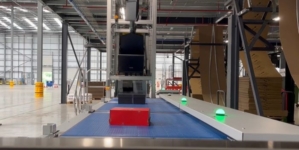-
BLACKOUT TECHNOLOGIES TARGETS TELEMATICS-INTEGRATED MOBILE DEVICE BLOCKING TO COMBAT SMARTPHONE DISTRACTION - April 1, 2025
-
OpenADR Alliance announces first OpenADR 3.0 certified products with EVoke Systems, E.ON Energy and Universal Devices - March 25, 2025
-
Growing fulfilment and contract packer appoints new Managing Director - March 25, 2025
-
When is it time to invest in a WMS? Understanding the key trigger points - March 25, 2025
-
eCapital helps Vantage Recruitment on its journey to financial success - March 24, 2025
-
Hugo Beck Celebrates 70 Years of Packaging Innovation with Open House Events - March 20, 2025
-
PROLOG FULFILMENT SUPPORTS LUNA DAILY’S COMMITMENT TO BETTER BODY CARE FOR ALL WOMEN - March 19, 2025
-
Motion Ventures launches largest-ever maritime tech fund at $100M to meet the industry’s new pace of adoption - March 18, 2025
-
ITD GLOBAL APPOINTS GROUP CHIEF REVENUE OFFICER - March 17, 2025
-
SURECAM TEAMS UP WITH ENTERPRISE FLEX-E-RENT FOR VEHICLE REPAIR & MAINTENANCE CONFERENCE - March 14, 2025
Who Needs Humans?
Revealed: Over half of us prefer to shop with retailers who offer self-checkouts
57% of us prefer to use self-checkouts
Convenience and speed are among the top reasons people choose to shop online
More than half of us spend more money online compared to in store
More information can be found here [insert link]
Brits are increasingly turning towards retailers who offer self-service payment options, with over half of us (57%) opting to avoid human interaction during the retail experience, a new study has revealed.
The research, conducted by delivery management company Whistl, found that it’s the older generation who still favour human interaction when making purchases. 70% of over 45s prefer to speak to a human, compared to only 25% of 18-24 year olds. When it comes to gender split, 53% of men would opt for a self-service payment option, compared to 47% of women.
The survey looked at how important human interaction is for certain types of shopping. When it comes to buying groceries, only 17% consider human interaction important.
When shopping for medical or beauty items in a pharmacy, more than 74% of people said it was important to have some level of human interaction. 26% said it was very unimportant, with some stating that the embarrassment of asking for certain products meant they preferred to use self-service options.
For more than half of us (63%), human interaction is not necessary when shopping for clothing. One in three (37%) said that they would only want human interaction if they couldn’t find what they were looking for or if they had a problem with an item they had already purchased.
While people may prefer the shopping experience without human contact, more than half of Brits prefer to speak to a person when they need customer service support, whether over the phone or face to face.
When it comes to spending habits, more than half of the people surveyed (51%) said they would spend more online compared to 39% who would spend more if they were shopping in store. However, the remaining 10% admitted that how much they spend either in store or online would depend on what they were buying.
Whistl’s research also examined the reasons people choose to shop online. Convenience was top of the list, followed by speed, more variety and cost. The research also found that, when travel and browsing are taken into consideration, shopping online can take on average half a day less than buying in store (delivery times excluded).* Avoiding crowds and not having to pay for parking were also reasons for favouring online shopping.
When it comes to ‘see in store and buy online’, 75% of people admit that they enjoy the experience of looking at products in the shop before purchasing it online. The most popular products for this are: fragrances, mobile phones/gadgets, jewellery and certain items of clothing, especially coats/jackets. Young men are more likely to visit stores to browse products, with 35% of 18-35 years old admitting to doing it at least once a month, compared to less than 20% of females the same age.
Melanie Darvall, Director of Marketing and Communications at Whistl, said:
“It’s clear from our research that the younger generation are more in favour of online shopping. Being able to access products at our fingertips offers speed, convenience, variety and in many cases, savings on products.
“It does appear, however, that many of us still enjoy the experience of being able to browse products in store before we buy. Sensory touch points for certain items such fragrances and clothing are clearly still very important for many consumers, and there may be more retailers can do to encourage purchases to be followed through from their shop to online store.
“It is now entirely possible to conduct the entire retail journey without human interaction – items are delivered through the post and can be returned via deposit boxes. Human interaction is however key when it comes to customer service. Retailers should ensure they are offering the best possible customer experience to ensure repeat business.”

































